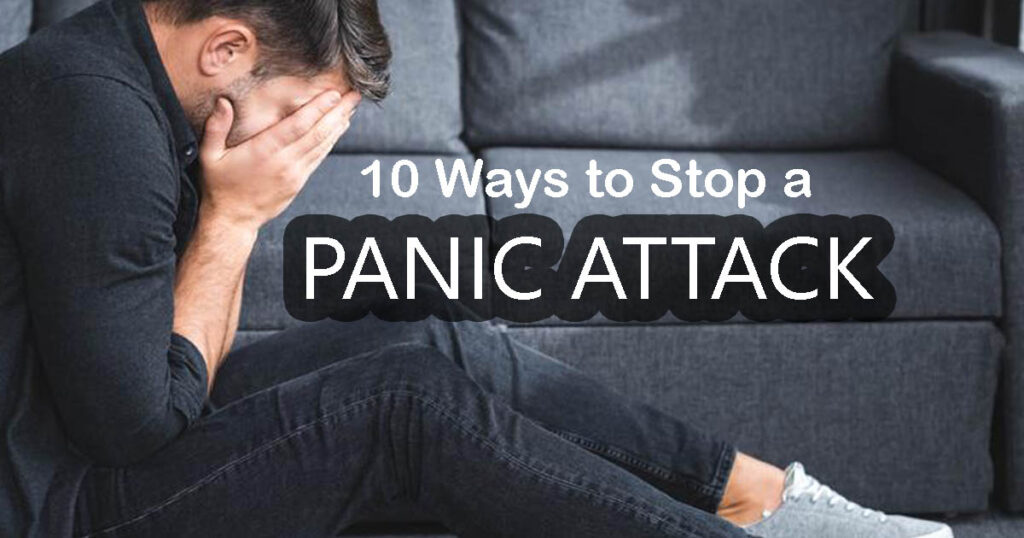10 Ways to Stop a Panic Attack

What is Panic attack ?
The panic attack is a severe wave of fear characterized by its unexpected dynamic intensity. And you feel like you’re dying or going crazy.
Many people with panic attacks have difficulty breathing, as well as sweating, trembling, and heart palpitations. Some people perceive chest pain during a panic attack as a sign that they are having a heart attack. Have had a stroke but in reality it is often due to panic.
Symptoms of a panic attack
Symptoms of a panic attack are sudden and usually reach their peak within 10 minutes and last for barely an hour. Panic attacks can happen anywhere and anytime. When you are driving or relaxing at home.
Panic attack symptoms include:
- Shortness of breath
- Chest pain or discomfort
- Feeling of choking or something getting stuck in the throat
- Feeling isolated from your environment.
- Sweating
- Nausea or upset stomach
- Dizziness, or fainting.
- Feeling annoyed
- Hot or cold flashes
- Fear of dying, losing control, or going crazy
This article will look at ways to prevent a panic attack and also look at how to help someone else when they are experiencing panic.
10 ways to stop a panic attack:
1. Use Deep Breathing
Deep breathing can reduce the symptoms of anxiety during an attack. Focus on inhaling and exhaling through your mouth, slowly filling your chest and abdomen with air and then slowly releasing them again.
Breathe for three, pause for a second, and then breathe for three. It is worth noting that for some people, deep breathing can increase the risk of panic attacks. Deep breathing should be avoided if this is the case
2. Find a peaceful location
If possible, try to find a more peaceful location. Sitting in a quiet place leaves room for intelligence, and makes it easier to breathe and focus on other assistants’ strategies.
3. Close your eyes
Some attacks of fear come from the stimulus that overwhelms you Close your eyes during a panic attack. This can block any additional stimuli and make it easier to focus on your breathing.
4. Use muscle relaxation techniques
Another symptom of panic attacks is due to muscle tension. The use of muscle relaxation techniques can limit the onset of panic attacks. These techniques will be most effective when you practice them thoroughly first. To do this:
1. Stop the tension for 5 seconds and forget everything
2. “Relax” when you release the muscles.
3. Let the muscles relax for 10 seconds before moving on to the next muscle.
5. Picture your favorite place
Think about what is the most comfortable place in the world. A sunny beach, a beautiful lake or the sound of water flowing from waterfalls. Picture yourself there, and pay close attention to it.
Keep your eyes closed and get lost in the blue water lake. This idea will take away your anxiety and you will feel better
6. Splash Water on Your Face
A spray of cold water on your face will give you a sense of relief. Have you ever noticed that when you spray cold water on your face, it changes your outlook? It quickly clears the digestive nerves which slows down our heartbeat by activating our digestive and immune systems.
7. Acknowledge that you’re having a panic attack
Knowing that you are having a panic attack instead of a heart attack and it is temporary and you are fine. Explain to yourself that this is a temporary problem and everything is fine, This will help you to get yourself out of the panic.
8. Tell Someone about panic attacks
If you have frequent panic attacks in an environment, let someone know so they can help you if it happens again.
9. Carry emergency dark chocolates
This technique is very simple for most people, with the use of chocolate you will enjoy the infusion of magnesium in your system. Dark chocolate also contains theobromine, which helps to improve your mood.
Just keep dark chocolate with you and when you think you may have a panic attack you can try eating chocolate. I hope the panic goes away without a hitch and at the same time you enjoy the chocolate
10. Keep lavender on hand
Lavender is known for its calmness and relief from stress. It can help relax your body. If you know that you are suffering from panic attacks, keep some lavender essential oil on your hands and some on your arms and breathe in its scent as soon as you have a panic attack. You can also take lavender or chamomile tea, which can also help relieve anxiety.
Final Words
Anxiety and panic attacks have the same symptoms, causes and risk factors. However, panic attacks are often more severe and often accompanied by severe physical symptoms. Talk to your doctor or therapist if you are experiencing symptoms of anxiety or panic in your daily life and are not sure what to do





